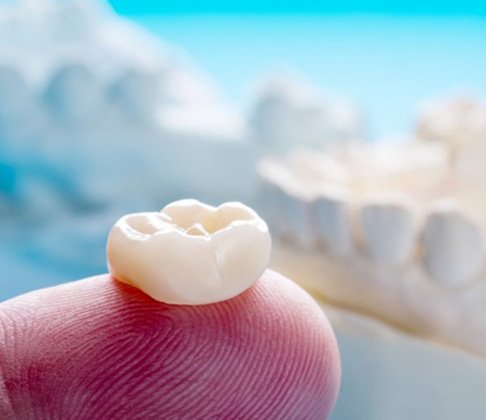Dental Crowns – Sachse, TX
Restore and Protect Damaged Teeth

Your tooth enamel is the strongest part of your entire body, but it is still vulnerable to damage. Teeth can be harmed by decay, injuries, accidents, and more. Fortunately, if you have a tooth that is structurally compromised, we offer dental crowns in Sachse to restore and protect it. We have durable and natural-looking restorations to help ensure that your smile continues to be comfortable and fully functional. To find out if a dental crown is right for you, give us a call .
Why Choose Wiese Dental for Dental Crowns?
- High-Quality Dental Materials
- Customized for Natural Appearance
- Dental Insurance Welcome
What Is a Dental Crown?

A dental crown is a customized “cap” that is placed over the chewing surface of a damaged or structurally compromised tooth to keep it protected. Crowns can be made from a variety of different materials. Depending on where they are placed in the mouth, we use gold, zirconia, and other natural-looking materials. You may need a dental crown if you have one of the following issues:
- Broken tooth that requires additional support
- Tooth that’s undergone root canal therapy
- Severe decay that’s being repaired with a large filling
- Dental bridge needing support from adjacent teeth
- Severely misshapen or discolored tooth
- Missing tooth being replaced with a dental implant
The Process of Getting a Dental Crown

Dental crown placement is relatively straightforward. It can usually be completed in just two visits to the dental office. The first step includes an examination of your teeth to make sure that a crown is the right option for you. Once this is confirmed by Dr. Wiese, a thin layer of enamel is removed from your tooth. This is to ensure that the crown fits comfortably in the mouth and appears natural. An impression will then be taken of the tooth. This will be sent to the dental laboratory where your crown will be crafted.
Until your next visit, you will be given a temporary crown to protect the tooth and help you get used to what your new crown will feel like. Once your final restoration is ready, you can come back to the practice, and it will be placed on your tooth using a special dental cement.
Benefits of Getting a Dental Crown

Dental crowns have a variety of benefits. Here are just some of them:
- Improves your comfort and chewing ability
- Protects your natural tooth to prevent further damage
- Can correct several different oral health issues
- Can be customized to match surrounding teeth
- Easy to maintain
Understanding the Cost of Dental Crowns

When you’re told that you need a dental crown, your immediate first concern may be how you’re going to fit it into your budget. We care about making sure that you can get the care that your smile needs without straining your bank account; we will therefore take the time to explain the factors that can affect the amount you end up paying, and we will review your financial options so that you can start planning ahead.
Factors That Affect the Cost of Dental Crowns

It’s easy to assume that everyone will pay the same amount for dental crowns, but there are actually a number of variables that can affect the final price:
- The Material Used: Will you get a traditional gold crown? Or do you instead want one made out of zirconia or another kind of tooth-colored material? Each type of crown comes with its own price tag.
- The Number of Crowns Needed: Do you only need one crown, or are there multiple teeth in your mouth that must be repaired? Obviously, if more than one crown is required, the overall cost will go up.
- Any Associated Treatments: Are you getting the crown as part of another procedure? Sometimes you will also need to account for the cost of a root canal or a dental implant.
Does Dental Insurance Cover Dental Crowns?

You may be planning to use your dental insurance plan to make paying for your dental crown easier. If so, you should have a clear idea of what your coverage looks like. Many dental insurance plans classify dental crowns as a major procedure and will cover around half the cost. That said, coverage can vary depending on what plan you have.
Note that dental insurance will normally only pay for crowns that are being placed for oral health reasons. If you are getting a crown simply to improve the appearance of your smile, your insurance plan may not pay for it.
There are some factors that might influence the amount that you’ll need to pay out of your own pocket, such as your insurance plan’s annual maximum and deductible. Figuring out the details of your plan can be tricky, but our team is here to help. We can review your policy with you and answer any questions that you might have.
Options for Making Dental Crowns Affordable

What can you do if you don’t have an insurance plan to make paying for a dental crown easier? At our office, you have the option of applying for CareCredit. This third-party financing company helps patients across the country get the treatments that they need without breaking the bank. A CareCredit payment plan divides the cost of your care into smaller monthly installments, and it will typically come with little to no interest attached.
Dental Crown FAQs
Does It Hurt to Get a Dental Crown?
Before removing any enamel for the purposes of a dental crown, we will be sure to numb your mouth completely. As a consequence, you aren’t going to have to worry at all about pain during this part of the procedure.
We don’t always numb people’s mouth before actually placing the crown on your tooth. This is usually not the most painful part of the procedure, but we’ll be happy to give you anesthetic for this as well if you’d like.
After your permanent crown is in place, the gums around the restoration may be slightly irritated due to the adhesive. This should entail only minor discomfort, and can be handled easily enough with over-the-counter pain medicine.
Are Dental Crowns Safe?
We know what we’re doing when it comes to placing dental crowns, which means that you have no reason to worry about any risks associated with the treatment. In the case of both metal and ceramic crowns, the materials used are non-toxic, which means that you also don’t have to be concerned about any long-term health effects from dental crowns.
In some cases, however, patients may have allergies to the materials that are used in their restoration. If you find that you’re experiencing swelling or irritation that won’t go away, let us know so we can determine whether you’re experiencing an allergic reaction.
What Happens If You Wait Too Long to Get a Dental Crown?
Dentists don’t typically recommend dental crowns to their patients unless they really need them. Typically, if you delay a dental crown that you need, the decay affecting your tooth will only get worse. Eventually, you may even need a more extensive treatment in order to repair the tooth, like a root canal.
For that reason, we would strongly urge you not to wait on getting a dental crown if you need one.
Is It a Dental Emergency If Your Crown Falls Off?
If you lose a dental crown, that doesn’t necessarily constitute a dental emergency requiring a same-day appointment. However, it is an urgent enough situation that you should try and see your dentist within a few days. You may also want to expedite that appointment if your tooth is jagged, as there may be some risk of it cutting the soft tissues in the mouth.
You should also be sure to bring your dental crown to our office when you visit, as we may be able to place it back in your mouth in certain circumstances.
Does It Hurt to Get a Dental Crown?
Before removing any enamel for the purposes of a dental crown, we will be sure to numb your mouth completely. As a consequence, you aren’t going to have to worry at all about pain during this part of the procedure.
We don’t always numb people’s mouth before actually placing the crown on your tooth. This is usually not the most painful part of the procedure, but we’ll be happy to give you anesthetic for this as well if you’d like.
After your permanent crown is in place, the gums around the restoration may be slightly irritated due to the adhesive. This should entail only minor discomfort, and can be handled easily enough with over-the-counter pain medicine.
Are Dental Crowns Safe?
We know what we’re doing when it comes to placing dental crowns, which means that you have no reason to worry about any risks associated with the treatment. In the case of both metal and ceramic crowns, the materials used are non-toxic, which means that you also don’t have to be concerned about any long-term health effects from dental crowns.
In some cases, however, patients may have allergies to the materials that are used in their restoration. If you find that you’re experiencing swelling or irritation that won’t go away, let us know so we can determine whether you’re experiencing an allergic reaction.
What Happens If You Wait Too Long to Get a Dental Crown?
Dentists don’t typically recommend dental crowns to their patients unless they really need them. Typically, if you delay a dental crown that you need, the decay affecting your tooth will only get worse. Eventually, you may even need a more extensive treatment in order to repair the tooth, like a root canal.
For that reason, we would strongly urge you not to wait on getting a dental crown if you need one.
Is It a Dental Emergency If Your Crown Falls Off?
If you lose a dental crown, that doesn’t necessarily constitute a dental emergency requiring a same-day appointment. However, it is an urgent enough situation that you should try and see your dentist within a few days. You may also want to expedite that appointment if your tooth is jagged, as there may be some risk of it cutting the soft tissues in the mouth.
You should also be sure to bring your dental crown to our office when you visit, as we may be able to place it back in your mouth in certain circumstances.




